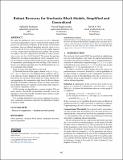| dc.contributor.author | Mohanty, Sidhanth | |
| dc.contributor.author | Raghavendra, Prasad | |
| dc.contributor.author | Wu, David X. | |
| dc.date.accessioned | 2024-07-12T16:20:11Z | |
| dc.date.available | 2024-07-12T16:20:11Z | |
| dc.date.issued | 2024-06-10 | |
| dc.identifier.isbn | 979-8-4007-0383-6 | |
| dc.identifier.uri | https://hdl.handle.net/1721.1/155672 | |
| dc.description | STOC ’24, June 24–28, 2024, Vancouver, BC, Canada | en_US |
| dc.description.abstract | We study the problem of robust community recovery: efficiently recovering communities in sparse stochastic block models in the presence of adversarial corruptions. In the absence of adversarial corruptions, there are efficient algorithms when the signal-to-noise ratio exceeds the Kesten–Stigum (KS) threshold, widely believed to be the computational threshold for this problem. The question we study is: does the computational threshold for robust community recovery also lie at the KS threshold? We answer this question affirmatively, providing an algorithm for robust community recovery for arbitrary stochastic block models on any constant number of communities, generalizing the work of Ding, d’Orsi, Nasser & Steurer on an efficient algorithm above the KS threshold in the case of 2-community block models. There are three main ingredients to our work: (1) The Bethe Hessian of the graph is defined as HG(t) ≜ (DG−I)t2 − AGt + I where DG is the diagonal matrix of degrees and AG is the adjacency matrix. Empirical work suggested that the Bethe Hessian for the stochastic block model has outlier eigenvectors corresponding to the communities right above the Kesten-Stigum threshold. We formally confirm the existence of outlier eigenvalues for the Bethe Hessian, by explicitly constructing outlier eigenvectors from the community vectors. (2) We develop an algorithm for a variant of robust PCA on sparse matrices. Specifically, an algorithm to partially recover top eigenspaces from adversarially corrupted sparse matrices under mild delocalization constraints. (3) A rounding algorithm to turn vector assignments of vertices into a community assignment, inspired by the algorithm of Charikar & Wirth for 2XOR. | en_US |
| dc.publisher | ACM | en_US |
| dc.relation.isversionof | 10.1145/3618260.3649761 | en_US |
| dc.rights | Creative Commons Attribution | en_US |
| dc.rights.uri | https://creativecommons.org/licenses/by/4.0/ | en_US |
| dc.source | Association for Computing Machinery | en_US |
| dc.title | Robust Recovery for Stochastic Block Models, Simplified and Generalized | en_US |
| dc.type | Article | en_US |
| dc.identifier.citation | Mohanty, Sidhanth, Raghavendra, Prasad and Wu, David X. 2024. "Robust Recovery for Stochastic Block Models, Simplified and Generalized." | |
| dc.contributor.department | Massachusetts Institute of Technology. Computer Science and Artificial Intelligence Laboratory | |
| dc.identifier.mitlicense | PUBLISHER_CC | |
| dc.eprint.version | Final published version | en_US |
| dc.type.uri | http://purl.org/eprint/type/ConferencePaper | en_US |
| eprint.status | http://purl.org/eprint/status/NonPeerReviewed | en_US |
| dc.date.updated | 2024-07-01T07:51:24Z | |
| dc.language.rfc3066 | en | |
| dc.rights.holder | The author(s) | |
| dspace.date.submission | 2024-07-01T07:51:24Z | |
| mit.license | PUBLISHER_CC | |
| mit.metadata.status | Authority Work and Publication Information Needed | en_US |
